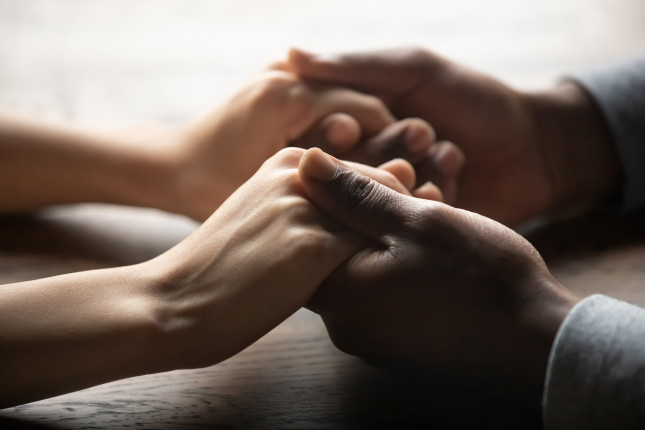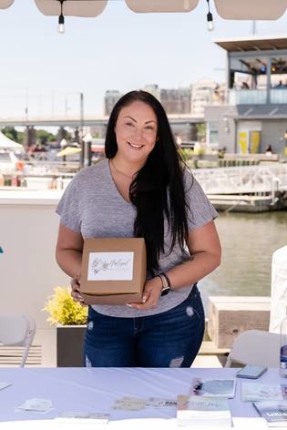-
The Missing Link: Stillbirth & Self-Care
September 28, 2022 By Elizabeth O'DonnellFor many people, stillbirth— the occurrence of a fetal death at 20+ week’s gestation—is a concept. A statistic. Each year, at least 23,000 stillbirths occur in the United States. It occurs in one out of every 160 pregnancies. Yet when these numbers become a reality in your own life, they take on a new meaning.
On the evening of November 28, 2020, I walked into the hospital thinking I was being a worrisome first-time mom. I had great doctors. I had read up on, what I thought was, everything I needed to know about being pregnant. I was the most fit and healthy I had ever been while pregnant, but then I noticed that I hadn’t felt Aaliyah move in a while.
Yet when I was told those dreaded words, “There’s no longer a heartbeat,” and when I heard my midwife describe this as a “fetal demise” to my doula over the phone, I felt nothing. Every feeling, emotion, future plan vanished. Everything left my mind. I just sat there and said: “I thought stillbirth only happened in the 1800s.”
I was in shock. And I stayed in that shock, mostly composed, for the next three days, until I delivered Aaliyah Denise on December 1, 2020.
When you walk into a hospital pregnant, and then walk out of the hospital no longer pregnant, and without your baby in your arms, your world stops. You feel like a shell of your former self, and unworthy of absolutely everything this world has to offer.
The statistics on stillbirth are even more alarming for women of color and exploring the whys of stillbirth is quite frustrating. Some families are told that healthy babies just die (a myth), or that there simply is no cause of death (another myth). The truth is, we don’t have all of the answers yet.
Support groups and social media support work for some who experience these tragic events. – But what are we—as a society—doing immediately for birthing people who have experienced, what many would describe as the greatest loss of all? How can we give permission to parents to know it is okay, healthy and necessary for them to take care of themselves at a time when they only want their baby back?
After Stillbirth: Mental Health & Self Care
Many who experience stillbirth most likely have a nursery set up and ready to go. They have been told what they will experience, whether it is during a routine checkup, or when they arrive in labor at the hospital and need to quickly prepare for the exact opposite of all they planned.
The process of labor and delivery doesn’t change during stillbirth. Just the outcome. Rather than walking out with your baby, you walk out with pamphlets on grief therapists—or perhaps a memory box for your child. This box is a deeply painful reminder that they are dead and here you are, expected to go back out in the world after a short bout of grief and function the way you did before.
To observe that one’s mental health takes a hit after experiencing stillbirth is a massive understatement. Everyone’s grief looks and sounds different. My own grief manifests itself as “numbness.” To this day, I often feel numb when it comes to just about everything. I’m simply not interested in anything anymore. I take care of myself, see my therapist weekly, and speak about my experience with those who understand. But the reality is that my mental health is forever altered because of this experience. And I am not alone in this.
Labor and delivery departments, social workers, and perinatal bereavement coordinators are beginning to see the value in offering a more tangible form of support for families and have taken steps to comfort families during those initial days of grief. It is a welcome development. Organizations like PUSH for Empowered Pregnancy and doctors like Dr. Harvey Kliman of Yale, are working to better understand stillbirth. Rainbow Clinics have been established to provide extra medical care and support for families going through a pregnancy after stillbirth.
Tangible bereavement support has helped me greatly in my grief. Providing mothers/birthing people with a tangible bereavement support after a pregnancy or infant loss has long been overlooked in our country. As we become more aware of this issue as a society, we need to learn about, and take a moment to understand, the value that this form of support brings to families. While the notion of “self-care” is far from one’s mind while in the midst of experiencing this physical and emotional trauma, this concept is critical to the grief journey no matter what stage one is in—and especially at the beginning.
From Pain to Purpose: Aaliyah in Action
My motherly instinct to give my daughter a legacy in this world led me to create Aaliyah in Action. I was motivated to help others in this particular way after personally responding positively to self-care after experiencing stillbirth.
One key element of Aaliyah in Action is to serve as an avenue for hospitals to provide immediate self-care support, focused entirely on the birthing person. Through care-packages carefully curated to include items that provide comfort and a sense of healing, birthing people walk out of hospitals with something specifically for themselves during a time when feelings of worthlessness and self-hatred are high.
Timing and location are key. Offering this package to a family while in the hospital plays a critical role. In the mindset of a mother whose baby just died, this package presented by the hospital essentially gives permission to those who have suffered stillbirth to use what’s inside it. It is given in the moment when it is most needed – and presented as support from someone who has walked this path before you.
Why is tangible bereavement support so critical—especially after a pregnancy loss? So soon after this tragic event, the reality is that not all of those who grapple with stillbirth and the grief that accompanies it are ready to join a support group or call a grief therapist. These steps force a parent to step into a new reality—and acknowledge that their child is dead.
While this recognition is an important element to the grief journey, it needs to happen at its own pace and in its own time. In my experience, I realized very quickly that support groups did not fit into my grief journey. I wondered what help might fit better. I sought tangible support, such as self-care items, because they allowed me to control what I did and used next. It helped restore a feeling of control and decision making that is immediately stripped from anyone going through the trauma of stillbirth, or any form of pregnancy or infant loss.
Self-care items aren’t the only important piece to this support. Aaliyah in Action packages also include a “Self-Care Choice Board.” This board has 25 actions one can take each day to help those experiencing stillbirth feel as though they’ve done something. For example, being able to cross “take a warm shower” or “say your baby’s name out loud” off the list can restore a bit of control for those who are grieving. The control that accompanies choosing the action and then following through with it is huge for parents in this grief space.
Guiding parents who have experienced loss in the direction of self-care has great value. Feelings of self-blame are alarmingly high after one goes through a perinatal death. Hospitals can change the narrative, even if just a bit, by providing this support and giving permission to practice self-care.
Those who experience this tragedy are not alone. While a self-care package isn’t going to eliminate feelings of isolation, it does give the parent an opportunity to see there are others that are walking alongside them in their loss. They can realize that others know what this feels like—and that people who have gone before them have chosen specific items, just for them, to help get them through another day.
Elizabeth O’Donnell, Founder & CEO of Aaliyah in Action. Since the death of Aaliyah, Elizabeth realizes her job as a mother is to establish a legacy for her daughter while also supporting families down this same path in life.
Sources: Aaliyah in Action, Mount Sinai, Push for Empowered Pregnancy, Yale School of Medicine
Lead Photo Credit: A couple holding hands over a table, courtesy of fizkes/Shutterstock.com.
Secondary Photo Credit: Founder & CEO of Aaliyah in Action, Elizabeth O’Donnell, holding an example of the Aaliyah in Action Self-Care packages given to parents experiencing loss. Courtesy of Elizabeth O’Donnell.
 A Publication of the Stimson Center.
A Publication of the Stimson Center.





